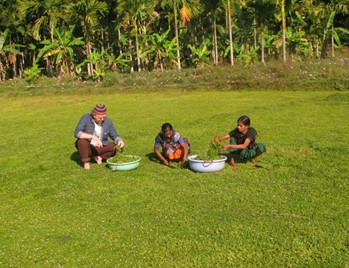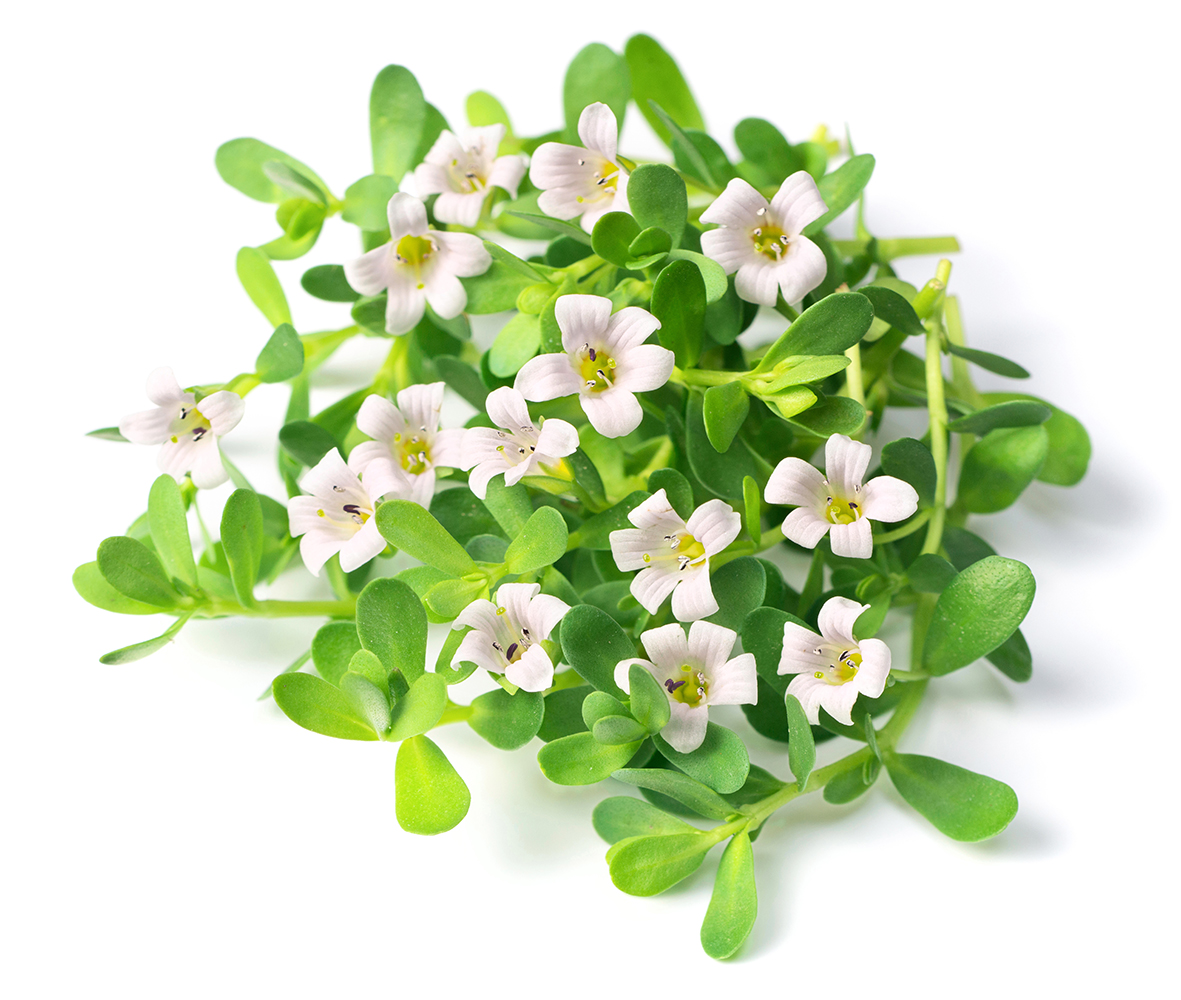Research has shown that regularly taking Bacopa monnieri for eight to twelve weeks can improve your memory.
“Nootropic” is a pharmaceutical term first used in 1972 to describe a pharmaceutical drug, Piracetam, which was being researched for its memory-enhancing properties. It was soon adopted as a term to refer to memory-enhancing plants in herbal medicine.
The most powerful herbal nootropic is from the Ayurvedic herbal tradition: Bacopa monnieri. Bacopa is a member of the Plantaginaceae plant family. It is a semi-aquatic tropical herb. I first discovered it as an ornamental growing in my tropical fish aquarium.
Modern Use of Bacopa for Enhanced Cognition, Mood and More
The primary chemical components of Bacopa are alkaloids brahmine and herpestine, flavonoids, saponins and bacosaponins.[1],[2] Bacopa has a significant body of research substantiating its benefits for the mind. [3] It is also used for a wide variety of other mental-emotional conditions including anxiety[4], insomnia, depression, epilepsy, mania and hysteria. It also should be considered for depression, drug addiction, Alzheimer’s disease, dementia, ADHD[5], Asperger’s syndrome, autism and hypertension. Besides these uses and benefits, Bacopa, being high in antioxidant compounds called bacosides, has also been found to have potent anticancer properties, being shown to kill aggressive brain tumor cells[6], and inhibit the growth of breast and colon cancer.
As these are all chronic conditions, it will take more than just a single dose to feel the full effects. A rough estimate is that it might take 2 to 3 months taking bacopa extract at a dose of 2-6 grams of the powder or 30 ml of the 1:5 tincture twice a day with meals. Bacopa extracts have been used in clinical trials at dosages of 100 to 1,050 mg/day with 225 mg/day given for up to 6 months.[7]
Quality bacopa products are now widely available with market sales as of 2019 valued at $315M with bright prospects for continued growth. This is especially true with a burgeoning aging population. It is estimated that 62 million Americans aged 65 and older are living with Alzheimer’s dementia in 2021. That comes to 1 in 9 people (11.3%) and 65 and older. Almost two-thirds of these are women, with older Black and Hispanics being 1 ½ to 2 times more likely to be afflicted.
There’s little difference in the manifestation of Alzheimer’s and dementia in terms of symptomology. Dementia is a group of symptoms that negatively impact memory, but Alzheimer’s is a progressive disease of the brain that slowly causes impairment in memory and cognitive function.
History of Use in Ayurveda
Bacopa has been in use in India for at least 1400 years. Bacopa is called “Brahmi” after the Hindu creator god. It was purportedly used by ancient Vedic scholars to help memorize lengthy hymns and scriptures. Ayurveda classifies Bacopa monnieri as Medya Rasayana, or “rejuvenator of the intellect.” It was used to bless the newborn because it was believed to enhance intelligence.
The Ayurvedic classification of Bacopa is:
Rasa (taste): Bitter, sweet. The bitter flavor means it is cooling, calming, and the sweet flavor which is barely detectable, attests to its being a tonic, especially for the mind.
Virya (energy): cooling further attesting to its detoxifying properties.
Guna (qualities): It is light, flowing and mildly laxative (western Herbalism would call this an “aperient).”
Dosha: Ayurveda is based on balancing the three bodily humours called “doshas”: In this case it balances all three humors, the nervous system (vata), the metabolic system (pitta) and the fluidic (kapha) system with a special effect on the Vata or nervous system including the brain.
Dhatu (bodily tissue): all tissues (because it is tridoshic)
Srotas (channels): circulatory, digestive, nervous and excretory
Ayurvedic Action:
Based on centuries of use bacopa has all of the following uses:
- Calms vata (nervous system)
- Redirects the blow of vata downwards (we would say it is ‘grounding”)
- It reduces mental illness
Make Sure the Brahmi You Have Is Really Brahmi
Bacopa is commonly called “brahmi” and one should be careful to not confuse it with gotu kola (Centella asiatica) a member of the Apiaceae family also known as “brahmi.” Both have intelligence- and memory-enhancing properties, but of the two Bacopa is stronger.
Bacopa is easy to grow. Just take a sprig of the plant and put it partially in water until it begins to root. Or if you can get a rooted cutting plant it a damp shaded area. It is low growing and makes a good ground cover. Because there are many subspecies of bacopa, be sure you have the Bacopa monnieri and not other look-alike plants, a few of which are mentioned here:
- Bacopa australis
- Bacopa caroliniana (Walter) B.L.Rob. – lemon bacopa, blue water hyssop, giant bacopa
- Bacopa decumbens (Fernald) F.N.Williams[8]
- Bacopa crenata
- Bacopa eisenii (Kellogg) Pennell – Gila River waterhyssop [9]
- Bacopa innominata (G.Maza) Alain – tropical waterhyssop [8]
- Bacopa madagascariensis
- Bacopa monnieri (L.) Pennell – water hyssop, moneywort, herb of grace
- Bacopa myriophylloides
- Bacopa repens (Sw.) Wettst.[8]
- Bacopa rotundifolia (Michx.) Wettst. – disc waterhyssop
- Bacopa stricta(Schrad.) B.L.Robins. – yerba de culebra[9]

Ed Smith and native Indian friends picking Bacopa
Adding to the confusion created by gotu kola and bacopa both being called “Brahmi,” is that some believe that the plant called rau dang, used as a bitter in Vietnamese cuisine, is also Bacopa.[9] I’m willing to stand corrected, but considering that Bacopa monnieri is rich in hard-to-digest saponins can cause digestive upset, I doubt that it is the same plant as rau dang. The plant called ‘Vietnamese bacopa’ (“Rai ram,” Persicaria odorata syn. Polygonum odoratum), which is not even related to Bacopa monnieri, is used in their cuisine.[10]
The often overlooked truth is that bacopa, especially when fresh, has fierce emetic and laxative properties. I know this from personal experience. Be sure to never eat or use fresh bacopa (or for that matter fresh calamus, another plant that likes to grow in moist areas near water). In this form these herbs are harsh on the gut to say the least. Even in India, where it is a popular herb taken as an asava or fermented fresh juice, it should not be taken in large quantities or on an empty stomach. However, when dried, bacopa is very safe.
To summarize: Bacopa monnieri is used to reduce anxiety, depression, and stress. It enhances memory, concentration and neurological reaction time. The active compound, Bacoside, easily crosses the blood-brain barrier where it binds to receptor sites to increase mental function and memory. And is used for neuroprotection, and balancing neurotransmitters. Among its many uses it has been shown to be beneficial for ADHD.
The standard dosage recommendations for Bacopa monnieri with 45% bacosides is 450 mg.
[1] Kapoor L, ed. CRC Handbook of Ayurvedic Medicinal Plants. Boca Raton, FL: CRC Press; 1990.
[2] Williamson EM, Hooper M. Major Herbs of Ayurveda. New York: Churchill Livingstone; 2002
[3] https://pubmed.ncbi.nlm.nih.gov/11498727/
https://pubmed.ncbi.nlm.nih.gov/23320031/
[4] https://hvmn.com/blogs/blog/supplements-bacopa-monnieri-memory-boosting-herb-for-anxiety
[5] https://draxe.com/nutrition/bacopa/
[6] https://pubmed.ncbi.nlm.nih.gov/28663722/
https://pubmed.ncbi.nlm.nih.gov/26681894/
https://pubmed.ncbi.nlm.nih.gov/30037060/
[7] https://www.ncbi.nlm.nih.gov/pmc/articles/PMC3153866/
[8] https://en.wikipedia.org/wiki/Bacopa_australis
[9] https://vietherbs.com/herb-directory/hung-lui-hung-dui/
References
https://www.ncbi.nlm.nih.gov/pmc/articles/PMC3746283
Ayurvedic Medicine by Sebastian Pole, pub Elsevier 2006 (Note: I consider this the best and most useful reference on Ayurveda and Ayurvedic herbs.)

